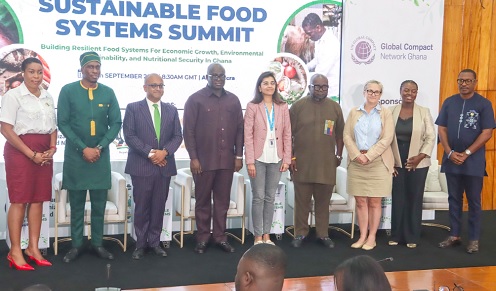The government has begun developing 100,000 hectares of farmland nationwide under an irrigation scheme, as part of the Feed Ghana Agenda, to complement existing projects and boost year-round farming, the Minister of Food and Agriculture, Eric Opoku, has announced.
He said the development of the hectares would be done in phases within the next four years.
Currently, the country has 229,000 hectares of irrigated arable land out of an estimated 1.9 million hectares of irrigable land.
The minister said the extent of irrigated land in the country was woefully inadequate, with some facilities also in poor condition.
Hon. Opoku was speaking at the Sustainable Food System Summit organised by the United Nations (UN) Global Compact in partnership with the UN Ghana, the Food and Agriculture Organisation (FAO), the 24-Hour Economy Secretariat, the Ghana Chamber of Mines and the Environmental Protection Agency (EPA).
The summit emphasises food and nutrition security as central to development, ensuring safe, affordable and healthy diets for all.
It also discussed concerns on resilient, inclusive agriculture that empowers smallholder farmers, especially women and youth, through access to finance, markets, and climate-smart technologies, among others.
The summit was held on the theme: “Building Resilient Food Systems for Economic Growth, Environmental Sustainability, and Nutritional Security in Ghana”.
Rehabilitation, expenses
Mr Opoku said the government had also commenced the rehabilitation of malfunctioning irrigation facilities.
“When we took an inventory of the irrigation infrastructure that is available, we realised that some of them were constructed during Dr Kwame Nkrumah’s time and some of them during Acheampong’s time.“
As we speak, some of them are not functioning at all. Some of them are operating under five per cent capacity, some at 10 per cent.
Not long ago, I was in Ashaiman to cut sod for the commencement of the rehabilitation of the Ashaiman irrigation facility, which was constructed somewhere in the sixties. We are also going to Aveyime in the coming days,” the minister said.
Mr Opoku said plans were underway for the construction of 10 new dams with support from the French and Brazilian governments, as well as the European Union, adding that the government was also rehabilitating eight existing ones.
The minister stated that the country’s food import bill was in excess of $3 billion, stressing the need to curtail it so that such resources could be retained locally and invested in other critical sectors of the economy.
Transforming choices into action
For his part, the UN Resident Coordinator, Zia Choudhury, called for a shift from food-related choices to concrete actions to ensure the production of food that met demand.
He urged the government to build a food system that was sustainable, equitable and just for all Ghanaians, as well as to encourage more youth and women into agriculture.
Mr Choudhury further urged the government to massively scale up debt relief and guarantee long-term investments, stressing that doing so was the foundation for the country’s success.
The UN Resident Coordinator said food systems contributed a third of all greenhouse gas emissions, indicating that transforming them was essential to limiting global warming.
“We have to demand stronger and faster climate action and commit to positive production that reduces the unsustainable use of land and water,” he said.








